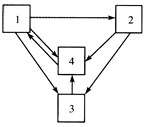问题
单项选择题
Text 4
| Cyberspace, data superhighway, multi-media—for those who have seen the future, the linking of computers, television and telephones will change our lives forever. Yet for all the talk of a forthcoming technological utopia little attention has been given to the implications of these developments for the poor. As with all new high technology, while the West concerns itself with the "how". the question of "for whom" is put aside once again. Economists are only now realizing the full extent to which the communications revolution has affected the world economy. Information technology allows the extension of trade across geographical and industrial boundaries, and transnational corporations take full advantage of it. Terms of trade, exchange and interest rates and money movements are more important than the production of goods. The electronic economy made possible by information technology allows the haves to increase their control on global markets--with destructive impact on the have-nots. For them the result is instability. Developing countries which rely on the production of a small range of goods for export are made to feel like small parts in the international economic machine. As "futures" are traded on computer screens, developing countries simply have less and less control of their destinies. So what are the options for regaining control One alternative is for developing countries to buy the latest computers and telecommunications themselves—so-called "development communications" modernization. Yet this leads to long-term dependency and perhaps permanent constraints on developing countries’ economies. Communications technology is generally exported from the U. S., Europe or Japan; the patents, skills and ability to manufacture remain in the hands of a few industrialized countries. It is also expensive, and imported products and services must therefore be bought on credit--credit usually provided by the very countries whose companies stand to gain. Furthermore. when new technology is introduced there is often too low a level of expertise to exploit it for native development. This means that while local elites, foreign communities and subsidiaries of transnational corporations may benefit, those whose lives depend on access to the information denied it. |
From the passage we know that the development of high technology is mostly in the interests of ______.
A.the world economy
B.the rich countries
C.scientific development
D.the elite
答案
参考答案:B
解析:文章第一段谈到,西方发达国家在网络空间、数字高速公路、多媒体等高端技术方面迅猛发展的同时,他们对贫困国家的利益却并不重视。文章第二段第一句话进一步指出,电子经济使得发达国家进一步控制全球市场,从而给贫困国家造成了毁灭性的影响。第三段和第四段接着谈到贫困国家在发展电讯事业方面对发达国家的长期依赖使得本国经济受到长期的约束。由此可推断,选项B符合题意。所以本题正确答案应当为B。

